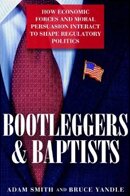The “Bootlegger and Baptist” theory, an innovative public-choice theory developed more than 30 years ago, holds that for a regulation to emerge and endure, both the “bootleggers,” who seek to obtain private benefits from the regulation, and the “Baptists,” who seek to serve the public interest, must support the regulation. Economists Adam Smith and Bruce Yandle provide an accessible description of the theory and cite numerous examples of coalitions of economic and moral interests that desire a common goal. The book applies the theory’s insights to a wide range of current issues, including the recent financial crisis and environmental regulation, and provides readers with both an understanding of how regulation is a product of economic and moral interests and a fresh perspective on the ongoing debate of how special-interest groups influence politics. Please join us for an engaging discussion of why government regulation fails so often to attain the public interest.

